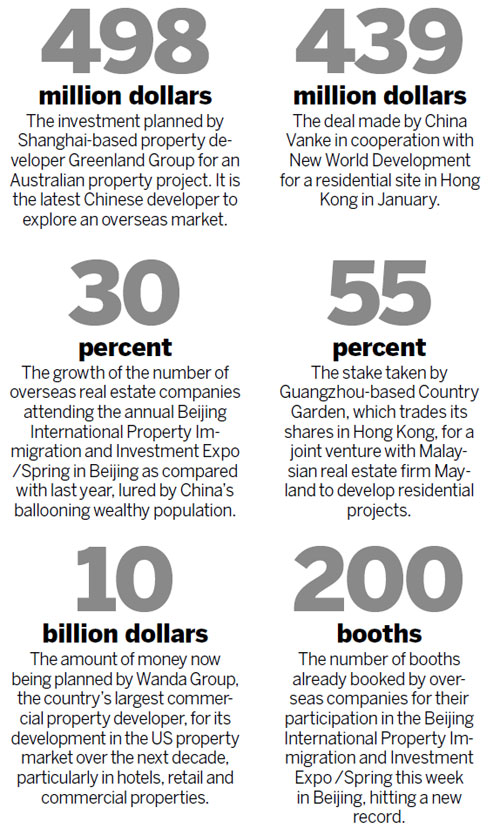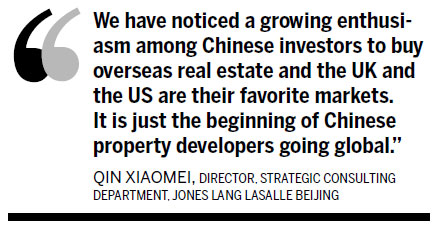Developers happy to follow buyers abroad
By Hu Yuanyuan (China Daily) Updated: 2013-04-08 07:31"After 30 years of development, our go-global strategy is ready to be implemented. Access to an open international capital market is necessary for such a strategy," said Tan Huajie, Vanke's board secretary.

Other Chinese real estate companies have also made inroads into overseas markets. Guangzhou-based Country Garden, which trades its shares in Hong Kong, set up a joint venture with Malaysian real estate firm Mayland in 2011 to develop two residential projects, taking a 55 percent stake. This was followed by Country Garden's development of a commercial complex in Malaysia last year. These projects, targeting local as well as Chinese buyers, will open for sale this year.
"We are also on the lookout for quality land parcels overseas. If there are appropriate opportunities, we will not miss them," one of the company's executives, who requested anonymity, said.
Wang Shi, Vanke's chairman, said on his micro blog that Chinese people make up the largest group of overseas buyers in the US property market, accounting for 11 percent of sales.
According to Qin Xiaomei, director at the strategic consulting department of Jones Lang LaSalleBeijing, an international real estate service provider, the country's developers are following the trail of Chinese buyers of overseas properties.
"We have noticed a growing enthusiasm among Chinese investors to buy overseas real estate and the UK and the US are their favorite markets. It is just the beginning of Chinese property developers going global," she said.
Meanwhile, Chinese buyers have been encouraged by the appreciation of the yuan and the central government's tough real estate policies at home to invest in properties overseas, according to Qin.
The government's new policies, especially the 20 percent taxation on capital gains for selling homes, further encourage investors to seek overseas property investment opportunities.
But for Andy Zhang, China managing director of international realty firm Cushman & Wakefield, Chinese developers' overseas expansion will not be their major business in the near future.
"Although there are more Chinese property

developers expanding overseas, it is more like a strategic move and their business focus will remain in China," said Zhang.
But there will definitely be more trials with overseas markets, also in the commercial and industrial sectors, he added.
For instance, Beijing Capital Land signed an agreement last year to purchase a land parcel in France on which it plans to establish a Sino-French economic zone.
Wanda Group, the country's largest commercial property developer, has revealed plans to invest $10 billion in the US over the next decade, particularly in hotels, retail and commercial properties.
For Zhang Ping, head of research in Beijing for Cushman & Wakefield, Chinese property investors are sometimes a bit slow in the decision-making process, compared with international competitors.
"In some cases they are still unfamiliar with the legal and investment environment in target countries but generally I think they are still a bit conservative."
huyuanyuan@chinadaily.com.cn
- Boeing eyes China's booming air delivery market
- China's bicyle-sharing firm gets tech upgrade
- Samsung to compensate Chinese consumer for Note 7 fire
- Walmart to open about 40 new outlets in China
- China to overtake US as top business travel market: Report
- Chinese-made speaker dares Amazon, Google
- Service sector in driving seat of growth, say experts
- Samsonite hopes to bag a bigger share of the China market


















